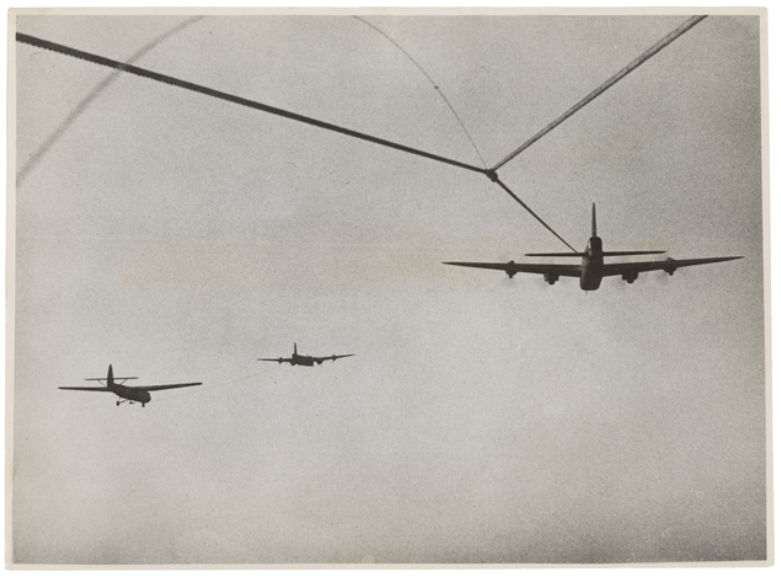Operation Varsity: 75th Anniversary

Stirlings from No. 38 Group tow Horsa Gliders towards their release points near the Rhine during Operation Varsity. AWM SUK14119
2020 marks the 75th anniversary of Operation Varsity, the Allied airborne crossing of the Rhine.
The operation involved some 17,000 paratroopers and glider infantry from the British 6th Airborne Division and the United States 17th Airborne Division as well as thousands of Allied air crew, including Australians, who transported and provided air cover to the force.
One of the more outstanding Australian ‘lucky escape’ stories of the day was that of Flight Lieutenant Jack Harrison, a Typhoon pilot whose aircraft was hit soon after a strafing run on a German flak position, which forced him to bail out in no man’s land between US paratroopers and German positions.
He was fired on by the Germans during his descent but reached the ground unwounded. He was rescued by two US paratroopers from the 17th Airborne, but when they saw his German belt buckle, his rescuers became his captors. He recalled that “I tried to convince them I was an Australian. I used all the American epithets I knew in the process, but I am tall and fair, and I was wearing a German belt, and they were just not having any.”
The Americans put Johnson to work unloading ammunition and other supplies until Harrison finally managed to convince an officer that he was indeed an Australian. Harrison did not wait passively for rescue; instead he was issued an American armband and a rifle and joined in combat operations with his erstwhile captors. He later stated, “I spent the time helping to pick off snipers, and taking a crack at any other Germans I could see. During the two days I was there I could see the Typhoons of my own wing sweep overhead to attack German positions in front of us. I could not always see what the target was, but I could see the smoke and flames rising and knew the boys were getting hits.”
When British armour reached the American positions two days later Harrison hitched a ride out of the combat zone back to his airfield, where he received a rousing welcome home.[1] Harrison survived the war and was decorated with the Distinguished Flying Cross and mentioned in despatches.
In the space of four hours the British and US transport command aircraft delivered their charges almost flawlessly to their destinations, but German flak had taken a heavy toll of the air crew, paratroopers and glider infantry. The Allies suffered some 2,700 casualties, a high price for their success. The German casualties are unknown, but some 3,500 soldiers became prisoners of war. By the end of the day, all major objectives were in Allied hands and the road to the Ruhr, Germany’s industrial heartland, was open. The end was nigh for Hitler’s Third Reich.
Learn more about Operation Varsity here.